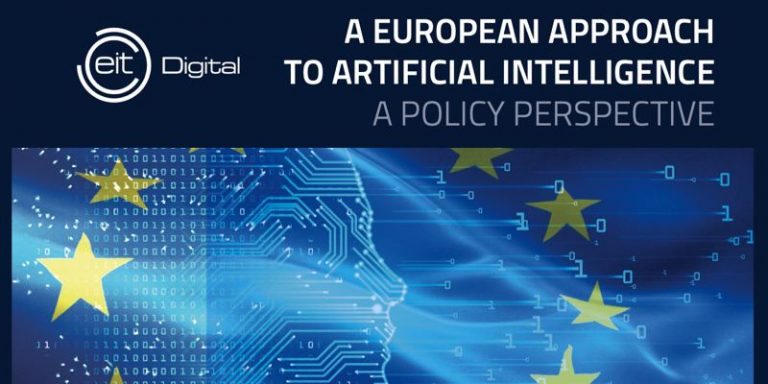
EIT Digital presented its third report in its Policy Perspective series. It addresses how Europe should deal with artificial intelligence and provides economic and political decision-makers with a scenario-based impact assessment tool for AI policy making.
The EIT Digital report explores the impact of artificial intelligence in general as well as in more specific and strategic application areas for Europe: health, manufacturing, climate and mobility. In all these areas, it identifies both general and sector-specific opportunities and concerns about the further deployment of AI. It concludes with an assessment of the impact on innovation potential, equity, trust and growth opportunities.
The main recommendations of the report
- To ensure an effective AI policy, it is necessary to take into account the context (sectors of application).
- Policies regarding the application of AI on personal data should be allowed to differ from policies regarding the application of AI on machine data, especially in certain application areas.
- General regulation or policy measures can be considered in relation to the transparency and explicability of algorithms.
- Regulation must be adaptable and flexible, while minimising and mitigating risks and guaranteeing human rights and European values.
The report is the result of a combined effort of five EIT Knowledge and Innovation Communities – EIT Manufacturing , EIT Urban Mobility , EIT Health , EIT Climate-KIC and EIT Digital as coordinator.
Increasing the positive impact of AI applications
In addition to the above recommendations, the report lists several principles that could help increase the positive impact of AI applications:
- Confidentiality management supported by AI: Data sovereignty could be supported by the development of an ecosystem where all data transfers will be carried out with guaranteed compliance with the DPMR, under the audit of the regulator. Personal data will be under the control of the subject and stored in a cloud. It may be transferred with consent/contract between the subject and other parties. The management of consent will be carried out with the support of the IA (an IA Personal Data Management Custodian) who will automatically accept the data exchange if it complies with the standard DPMR and/or accepted once by the subject for such a situation. When the AI officer concludes that there is a doubt, the subject will be notified and give consent or not, thus instructing the AI officer for the future. R&I projects could be encouraged to develop these ideas.
- Counterfactual checks and algorithm explainability: This is an approach proposed by Watcher et al. where they state that there are three objectives: to inform and help an affected person understand why a particular decision was made; to provide them with reasons for challenging adverse decisions; and to help them understand how to achieve an outcome given the current decision-making model. This would require regulation as well as R&I policies and actions.
- Sandbox-based regulation: Regulations should encourage the use of a sandbox approach to AI deployment, similar to Phase I-III clinical studies on drugs. In a sandbox, potential problems could be identified and confidence established prior to widespread deployment. The rules of a sandbox methodology could be different in different sectors, with a system in the healthcare sector similar to the current stepwise approval processes for drugs and equipment.
Download the EIT Digital report: HERE.
Translated from Une approche européenne de l’intelligence artificielle : EIT Digital fait part de ses recommandations









